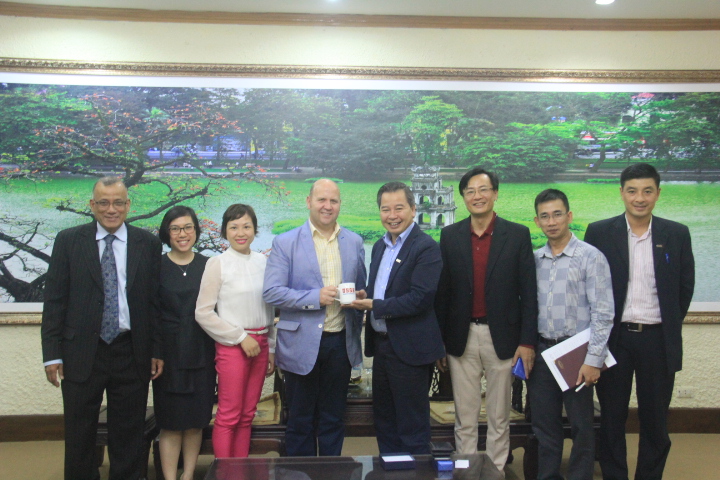
At the meeting, Prof. Dr. Pham Quang Minh introduced the main achievements in training, scientific research and the main research directions of the University; emphasizing the goal of building a research university, strengthening research projects, especially international publishing. The University is a leading training and research center in the Vietnamese higher education system and wishes to expand cooperation with the University of South Australia and Australian universities in general in many fields.
Dr. Shamsul Khan welcomed the welcome of the USSH and proposed that the two schools cooperate through activities such as student exchange, joint research projects and seminars. In particular, joint research projects and joint training programs in journalism and communication, international relations at undergraduate and postgraduate levels. The Faculty of Journalism and Communication, Faculty of International Studies will be the focal point between the USSH and the School of Communication, International Studies and Languages, University of South Australia (Australia).

Prof. Dr. Pham Quang Minh (Principal of the School) and representatives of the School presented gifts and took souvenir photos with the delegation of the University of South Australia.
Continuing the working program, Dr. Shamsul Khan and Ms. Lena (Department of International Relations, Faculty of International Studies) gave a presentation to students of the Faculty of International Studies on the topic "The rise of China, the United States after Obama, and the security structure of East Asia/Southeast Asia". The presentation outlined the current geopolitical and geo-economic context in relation to the security structure in Southeast Asia, especially with ASEAN countries, thereby proposing some options for ASEAN countries to perfect this structure. Currently, the power of the United States and the orderPeace depends on America(Pax Americana) has declined, OrderPeace depends on China(Pax Sinica) gradually emerged along with China's ambition to expand its influence. Meanwhile, under Putin's leadership, Russia wants to promote a new security structure in Europe, while forming an "equal and open security structure" with China in the Asia-Pacific region, thereby moving towards the goal of becoming a global subject.

Dr. Shamsul Khan presents the presentation
In the above strategic context, ASEAN countries have many different options to deal with the relationship between the great powers. According to Dr. Shamsul Khan, ASEAN can temporarily “avoid” tensions and conflicts when the United States loosens its security engagement in Southeast Asia; or “prevent” conflicts and tensions through institutional networks with like-minded countries inside and outside the sub-systems; or establish a “tangled” network of relations with countries outside the sub-systems; or initiate a process of soft multilateralism. Regardless of the choice, ASEAN countries must consider the effects of the geopolitical and geo-economic context on their security architecture.
At the end of his presentation, Dr. Shamsul Khan raised questions about the future of the East Asian/Southeast Asian security architecture such as: Will the “hub and spoke” system that the United States built through bilateral relations survive in the Donald Trump era? Will the power vacuum or shift in Asia increase the tension between the great powers in East Asia? Will Russia expand its geopolitical influence in Asia through its gradual rise and cooperation with China to limit the presence of the West? These questions were discussed enthusiastically and frankly by the lecturers and students in the auditorium.

Prof. Dr. Pham Quang Minh asked Dr. Shamsul Khan

Overview of the seminar
The University of South Australia (UniSA) is located in Adelaide and was established in 1991. After many years of development, UniSA is now one of the 8 schools in the GO8 group (the group of 8 best universities in Australia). UniSA has 8 research institutes, 13 research centers and a staff of up to 2,287 people. Each year, about 34,000 students study here, 1/3 of which are international students from 160 different countries. The School of Communication, International Studies and Languages is ranked 5 stars excellent according to the QS World University Rankings 2014.
Author:Tran Minh
Newer news
Older news